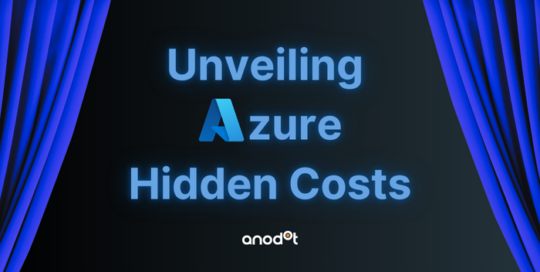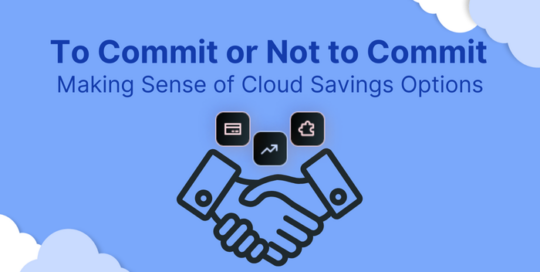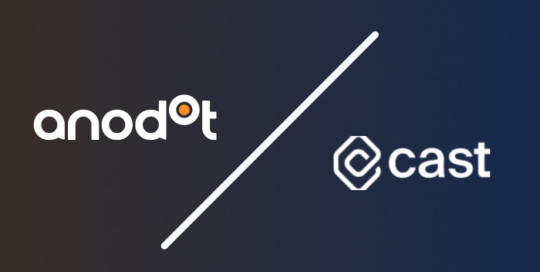Azure Structured Query Language (SQL) has 18 different deployment options, service tiers, compute models, and two different pricing models: vCores and Database Transaction Units (DTU). Because of these complexities, it’s nearly impossible to project monthly budgets!
This guide, part of our Azure Pricing series, will explain the common Azure SQL pricing configurations and offer tips on optimizing your cloud budget.
In this article:
What is Azure SQL database?
An Azure SQL database is a cloud-based SQL server that handles automated database management functions like upgrades, patches, backups, and monitoring. This type of database is appealing because it can scale and offers hands-off service offerings.
Azure SQL pricing is so complicated because of the different prices associated with the deployment methods, service, and compute tiers. First, there are three different deployment methods, then three service tiers, and finally, two compute models, not to mention the already 18 different types of offerings – and that’s not even getting into if you want to pick a DTU or vCore model.
We’ll discuss different examples of how these prices fluctuate depending on whether you choose a DTU model with a managed instance deployment method in the hyperscale provisioned compute model, but for now, let’s define some of these terms.
Deployment methods
There are two pricing models for Azure Functions: Consumption and Premium.
Let’s break down these models so you can decide which works best for you and your business:
1. Managed instance
The model that gets you a fully managed Microsoft SQL Server Database Engine. Expect easy on-premise SQL Server database migrations.
2. Elastic pool
Provides shared resources via a group of Azure SQL Single Databases.
3. Single database
As it sounds, this is a single database used by an organization.
Service tiers
Now that we’ve finished covering the different deployment models, here’s a breakdown of the three service tiers you should expect.
(Again, we’ll discuss these in terms of largest to smallest).
1. Hyperscale
Best used for enormous Online transaction processing (OLTP) systems. With this service tier, you can auto-scale storage and compute commands.
2. Premium/Business critical
Best used for medium to large OLTP systems. Expect high latency and low resilience.
3. Standard/General purpose
Best service tier for common workloads.
Compute models
There are also two compute models you should be aware of:
1. Provisioned
This compute model includes Azure resources to help you run your database.
2. Serverless
This model acts as a serverless component. Expect auto-scaling compute with billing per second use.
Pricing by service tiers for Azure SQL
Now that we’ve covered the different deployment options and compute models, here’s what the two Azure SQL pricing models, DTU and vCore, look like. We’ve included breakdowns of example costs for common combinations with these pricing models.
DTU stands for Database Transaction Units. It measures the compute resources needed to keep your database running.
You can use Azure’s DTU calculator to determine exactly how many DTUs you need. Prices increase depending on the number of DTUs your database requires and the storage needed. No matter your DTU selection, you’ll get a minimum of 250 GB of storage.
Here’s an example of what Azure SQL DTU pricing for the Standard instance in the Eastern US region looks like:
DTU Model
DTU stands for Database Transaction Units. It measures the compute resources needed to keep your database running.
You can use Azure’s DTU calculator to determine exactly how many DTUs you need. Prices increase depending on the number of DTUs your database requires and the storage needed. No matter your DTU selection, you’ll get a minimum of 250 GB of storage.
Here’s an example of what Azure SQL DTU pricing for the Standard instance in the Eastern US region looks like:
| DTUs | Included storage | Max storage |
Price for DTUs + storage
|
|
| S0 | 10 | 250 GB | 250 GB | $0.0202/hour |
| S1 | 20 | 250 GB | 250 GB | $0.0404/hour |
| S2 | 50 | 250 GB | 250 GB | $0.1009/hour |
| S3 | 100 | 250 GB | 1 TB | $0.2017/hour |
| S4 | 200 | 250 GB | 1 TB | $0.4033/hour |
| S6 | 400 | 250 GB | 1 TB | $0.8066/hour |
| S7 | 800 | 250 GB | 1 TB | $1.6130/hour |
| S9 | 1,600 | 250 GB | 1 TB | $3.2260/hour |
| S12 | 3,000 | 250 GB | 1 TB | $6.0488/hour |
vCore Mode
The vCore pricing model is more flexible than the DTU model. You can use virtual cores to measure your resources similarly to using on-premise server cores.
To provide the most detail, here’s a close-up of how vCore pricing changes depending on whether you choose the provisioned or serverless compute model.
Provisioned compute
Provisioned compute prices are calculated based on the number of vCores you choose. Be aware that vCore prices can fluctuate depending on whether you have Azure Hybrid Benefit. If you do have Azure Hybrid Benefit, you can save 40% and transfer your current SQL Server licenses to your vCores. If you only have a standard Microsoft software license, you’ll be paying the standard prices we list below.
All below prices are for the East US region and are based on Single Base deployment and use the Standard service tier:
| vCORE | Memory (GB) | Pay as you go | 1 year reserved capacity | 3 year reserved capacity |
| 2 | 10.2 | $0.505/hour | $0.398/hour | $0.337/hour |
| 4 | 20.4 | $1.009/hour | $0.796/hour | $0.674/hour |
| 6 | 30.6 | $1.514/hour | $1.194/hour | $1.011/hour |
| 8 | 40.8 | $2.018/hour | $1.592/hour | $1.348/hour |
| 10 | 51 | $2.522/hour | $1.990/hour | $1.685/hour |
| 12 | 61.2 | $3.027/hour | $2.388/hour | $2.022/hour |
| 14 | 71.4 | $3.531/hour | $2.786/hour | $2.359/hour |
| 16 | 81.6 | $4.035/hour | $3.183/hour | $2.696/hour |
| 18 | 91.8 | $4.540/hour | $3.581/hour | $3.033/hour |
| 20 | 102 | $5.044/hour | $3.979/hour | $3.370/hour |
| 24 | 122.4 | $6.053/hour | $4.775/hour | $4.043/hour |
| 32 | 163.2 | $8.070/hour | $6.366/hour | $5.391/hour |
| 40 | 204 | $10.088/hour | $7.958/hour | $6.739/hour |
| 80 | 396 | $20.175/hour | $15.915/hour | $13.477/hour |
| 128 | 652 | $32.280/hour | $25.464/hour | $21.563/hour |
Watch out for these additional provisioned compute prices:
- The above prices only cover compute charges. Storage prices are billed separately. For example, you’ll see $0.115 per GB/month using the Premium Azure Blob Storage tier.
- Expect to pay $0.20 per GB/month if you require point-in-time recovery.
- Expect to pay $0.05 per GB/month if you require long-term retention.
Serverless compute
Choosing the vCore serverless compute option means you can dynamically pick between 0.5 and 16 vCores and between 2.02 GB and 48 GB of memory.
The serverless compute vCores cost $0.5218 per vCore hour and $0.115 per GB/month. You should also be aware of additional charges such as:
- $0.20 per GB/month for backup storage if you ever require point-in-time restoration
- $0.05 per GB/month if you require long-term retention
Need more info on Azure pricing? Check out our guide to Azure Savings Plan and Azure Functions Pricing.
Optimizing Azure SQL pricing
Anodot’s cloud cost management solution means you don’t have to question your Azure SQL pricing budget because you’ll get 100% end-to-end visibility. Our tools enable you to control your budget and uncover previously unknown charges, all while fully aligning your FinOps, DevOps, and Finance teams.
Anodot’s tool provides complete visibility into Azure SQL pricing while eliminating wasteful spend. Use our ML-driven forecasting tool to properly allocate costs by service, unit, team, app, and more. Save up to 40% on annual cloud spend, and don’t puzzle over Azure pricing again. Instead, you can focus on what matters – providing quality services and meeting quarterly goals.
Get proof of concept. Talk to us for more insight into Azure SQL prices and how much you can save with Anodot’s tools.

Elisha Ben Zvi
VP R&D, Anodot
Elisha is a seasoned R&D leader with over 20 years of expertise in AI-driven business monitoring and cloud cost management.
TIPS FROM THE EXPERT
1. Leverage Azure Hybrid Benefit for licensing savings
If you have on-premises SQL Server licenses, Azure Hybrid Benefit allows you to transfer those licenses to Azure SQL, reducing your vCore costs. This is especially valuable for production workloads requiring dedicated compute power.
2. Choose the right service tier based on workload
Don’t overprovision your service tier. Use the General Purpose/Standard tier for common workloads and reserve Business Critical/Premium or Hyperscale tiers only for high-performance or mission-critical applications with intensive transaction requirements.
3. Opt for serverless compute for intermittent workloads
Serverless compute can automatically scale up and down, pausing when not in use. This pricing model is ideal for databases with unpredictable or infrequent usage patterns, offering savings by billing only for the compute resources consumed.
4. Optimize backup storage costs
Review your backup strategy to avoid unnecessary costs. Azure SQL charges for point-in-time backups and long-term retention. Set appropriate retention policies based on your actual business needs, and ensure older backups are periodically pruned to reduce costs.
5. Consolidate databases where possible
If you have multiple small databases, consolidating them can reduce administrative and storage overhead. Azure SQL’s multi-tenant architecture allows you to optimize costs by sharing resources across applications with similar requirements.




